Originally published in Thai on the101.world
Story and photo by Varuth Pongsapipatt
Translated by Prachatai English
As the sun is setting, Silom Road is crowded with people, each with their own destination: office workers on their way home for the night, tourists heading to hotels, restaurants, and bars, hawkers going to Patpong, and finally, male sex workers heading to their workplaces scattered around Silom.
Each sex worker found a different way into the business. Most of them only take male clients, while some do take female clients and some can be either top or bottom. Some offer specific services, using their hands and/or mouth. Some have a family, a wife and a child, but become service workers out of economic necessity.
There are Thai words reflecting contempt for men who do this job at many levels, ranging from male sex worker (ผู้ชายขายบริการ), rent boy (ผู้ชายขายตัว), male prostitute (โสเภณีชาย), to the pejorative word hooker (กะหรี่)’.
Importantly, lack of recognition of the status of LGBTQ still features in the stories of male sex workers.
Please call us “service workers”
Surong Janyam, Director of Service Workers In Group (SWING), a foundation working to promote health and rights awareness for sex workers, revealed that most of them prefer to be called ‘service worker’ since the definition of ‘sex worker’ is too shallow.
The most common view of sex work is that it’s easy. All you have to do is have sex with your client. People forget other aspects of such service work, such as serving food and drink, massage, conversation, or how to please the client.
Chamrong Phangnongyang, ex-service worker and Deputy Director of SWING, explained that the Foundation works with three groups of service workers. 1) Staff of massage parlours, such as those offering general oil massage or acupressure massage, and even ordinary massage parlours. Whether they are also sex workers depends on the specific establishment. 2) Service workers in bars or other entertainment spots, such as pubs, karaoke rooms, or go-go bars. 3) Independent service workers based in areas such as Pattaya and central Bangkok, including those who do sex work as a sideline through social media.
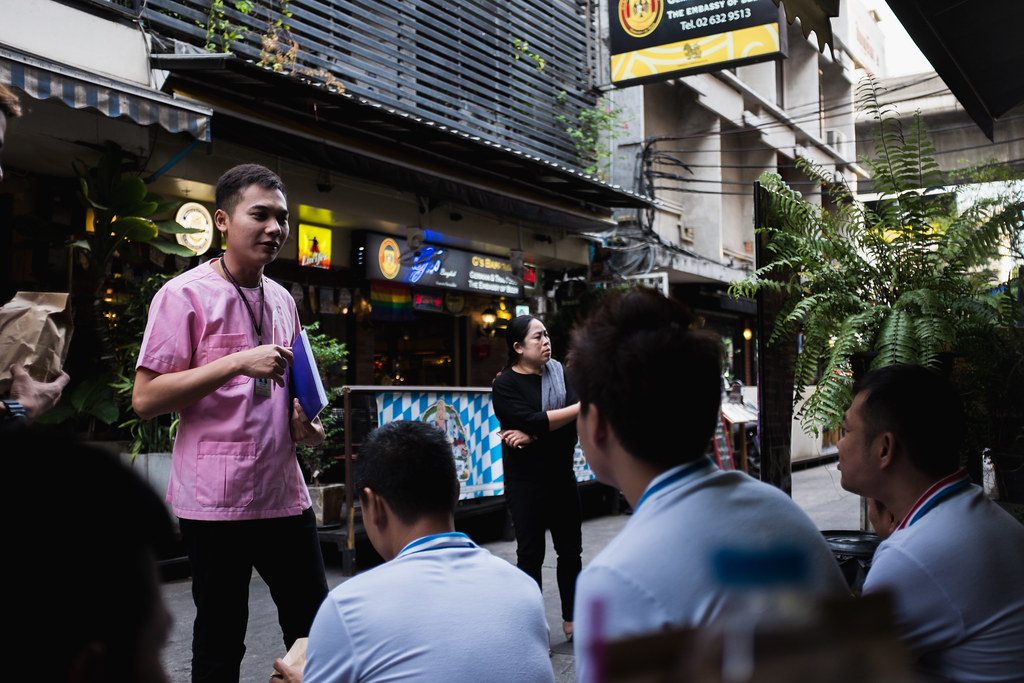
SWING gives information to promote health of service workers.
Chamrong said that most of them became service workers for financial reasons. Some began as waiters in bars, or as masseurs, before they realised that they could earn more through prostitution, go-go dancing, and using their bodies to satisfy a client’s sexual urges in some way. For some male workers who are already attracted to men, or who are transgender or effeminate gay men, becoming dancers, strippers, masseurs, and service workers can feel more suited to their temperament than heavy work, such as construction or other types of work.
Nevertheless, there are some male service workers who are not gay. Some of them have a family with children and chose the profession out of economic necessity. Apart from Thai workers, there are some from neighbouring countries – Myanmar, Laos, Cambodia, and Vietnam.
Even though most male service workers choose their profession voluntarily, it cannot be said that sex work is entirely free of human trafficking. Reports of illegal human trafficking by criminal groups still appear in the press from time to time, not to mention oppression and violence from state officials.
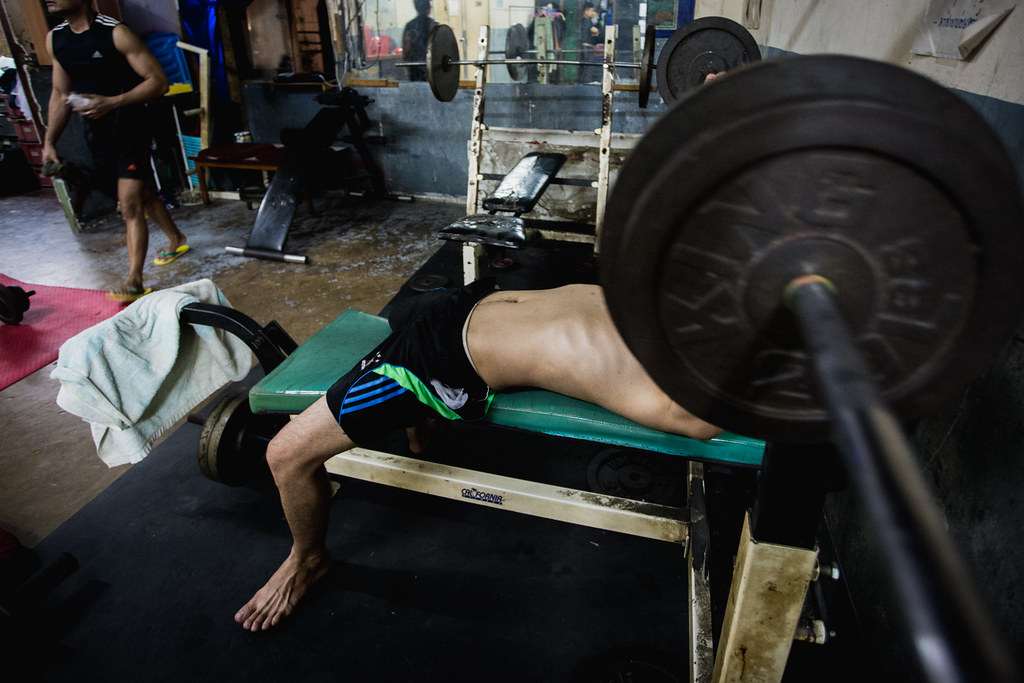
Service workers are provided with excercise equipments to improve attractiveness.
Anguish and Contempt
Tri (pseudonym), a former service worker now working with SWING, said there have been instances where service workers have been assaulted by foreign clients, but when they try to file a report with the police, they are not interested in the reason for the assault, but try to focus on how they met the foreigners, forcing them to confess to prostitution in order to charge them.
In addition to this, he has friends who were fined but, because they could not afford to pay, had their newly purchased mobile phones taken away. The officers told them to come to the station to get them back, but when they show up, they get brushed off.
“Someone like me extort a phone from a whore who peddles his ass like you?!” Tri related with sadness mixed with rancour what a friend of his had shouted at him by an officer.
Tri said that information about violence against male service workers is still kept secret. Even abused service workers themselves don’t feel brave enough to reveal information about their abuse, especially by state officials. Because of their gender, , officials are less likely to become as violent with female service workers women in comparison to males.
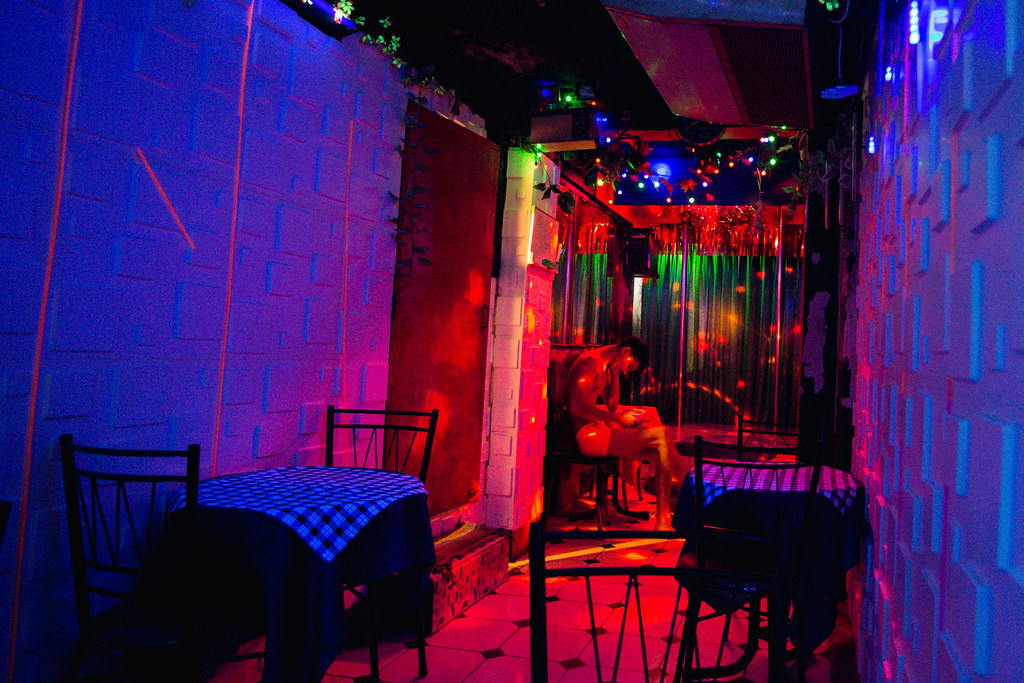
Red and blue are a favorite tone of decoration among service businesses.
This is because assaulting a woman may cause other problems for the officers, whereas for male workers, officers see them as men like them and so are more likely to use physical violence. On top of that, denial of their sexuality and negative attitudes towards service workers in Thailand cause male service workers to feel even less ready to reveal cases of assault.
From their field research and conversations with male service workers in 2014 - 2016, SWING said that there are two types of violence faced by male service workers.
- Physical abuse, such as
- Pattaya volunteer police assaulting trans women for prostitution, usually near the beach
- service workers assaulted by foreigners or their clients, in disputes over not paying the agreed charges
- assaults by people they know, either colleagues or other people in general who dislike or despise their profession
2. Emotional abuse, such as
- verbal abuse from volunteer police officers while they are looking for clients near the beach, after which they are then usually fined for prostitution
- quarrels with people around them, such as friends, motorcycle drivers, hawkers, resulting from contempt for their profession, or labelling by people in the profession
Male service workers often face many forms of abuse and harassment by government officials, including being arrested for no offence, being caught and accused of causing trouble to tourists, stealing tourists’ property, or even selling drugs. This is not like female service workers who are often charged with loitering or prostitution, and pay fines to evade prosecution, or depending on the officer.
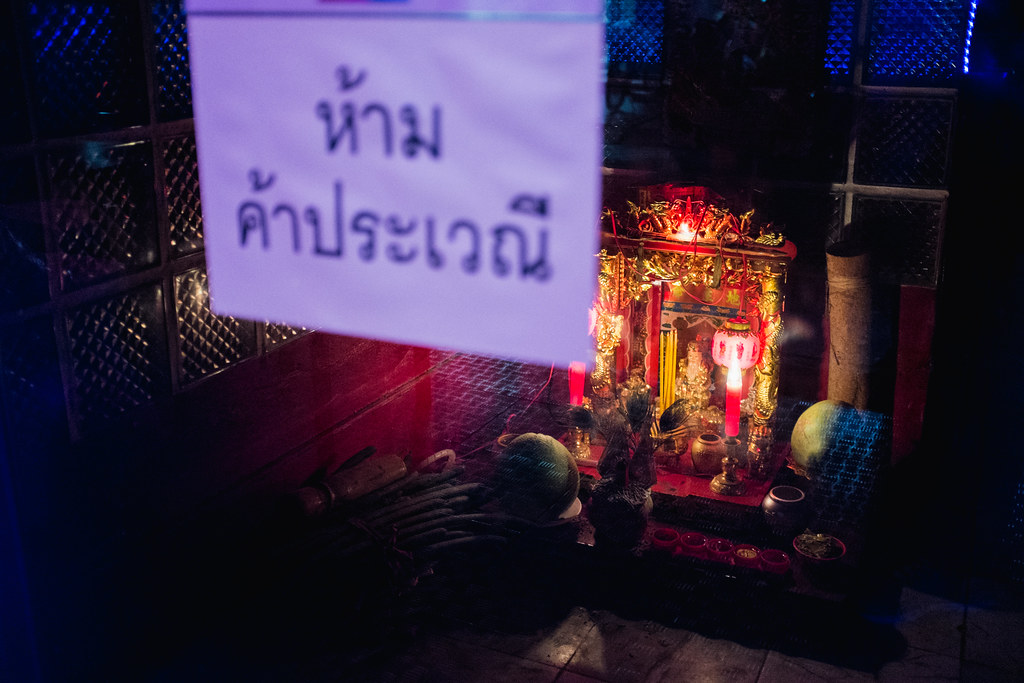
Police forces service businesses to put up a sign 'prostitutions are prohibited' in front of every place in that area.
Service workers who do not belong to a business generally pay a fine of 1,000 baht to officers on a regular basis - twice a day in some areas - amounting to 10,000 baht per month. The fine is based on Article 5 of the 1996 Prevention and Suppression of Prostitution Act, on the authority of officials, which states:
“Any person who, for the purpose of prostitution, solicits, induces, introduces herself or himself to, follows or importunes a person in a street, public place or any other place in an open and shameless manner or causes nuisance to the public, shall be liable to a fine not exceeding one thousand baht”
Notably, this Article allows officials wide interpretation, and makes it easy for officials to prosecute service workers, even though in fact the sex service workers may not have done anything within its scope.
While Article 5 of the 1960 Suppression of Prostitution Act had provisions about loitering or waiting in the street for the purposes of prostitution, and a penalty of 3 months in prison or a maximum fine of 1,000 baht, or both, there are no such provisions in the 1996 Act.
So, an officer’s interpretation of “shameless manner or … nuisance to the public” becomes an accusation which can be cited and interpreted to charge and fine service workers.
Most of the time, establishments that provide sexual services pay bribes to the officers so that their business can continue without harassment. But at certain periods, in spite of the bribes, they may be asked for more. At other times when police are being re-assigned, they may suffer from officials who are play-acting to build up a record, even though they have already received the bribes.
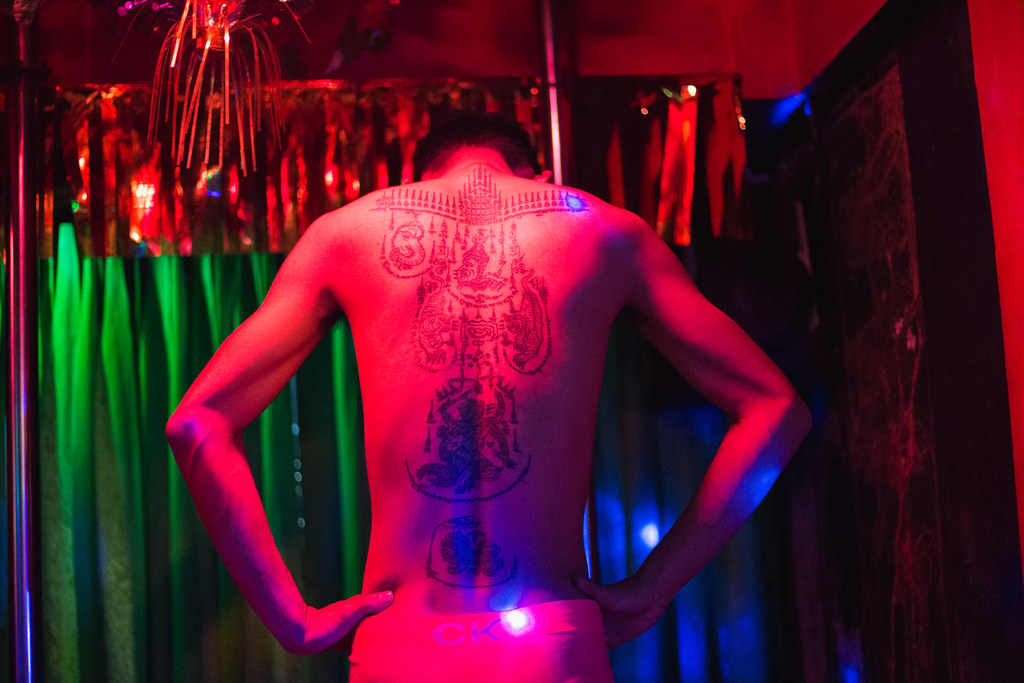
A service worker with a tattoo.
Destination of Male Service Workers
It is early in the evening; red and purple lights twinkle on Silom Road -- another world is beginning. Bar waiters are wiping down tables and calling out for customers. Men in white tank tops and brightly coloured shorts sit around the front of massage parlours. They have been calling out for customers since the afternoon. Their dreams are kept alive by the lottery, hoping only to win a big prize every 1st and 16th day of the month to pay off their family’s debt and land, or even to open their own business.
Bo (pseudonym), a Lao service worker, a homeless man who lives and works at SWING, said that all male service workers enter the business out of economic necessity. The pay is very high compared to other work that requires the same level of qualifications.
Being a service worker does not require a high education, only confidence in your appearance. Some people started as waiters or other jobs in bars or elsewhere in the night-time entertainment industry.
“We’re transgender and we didn’t go to school. What else can we do but work as a waiter and get paid 300 baht. We have no other choice. Everyone wants money. Whatever will help us get more money, we’ll do it," Bo chatted.
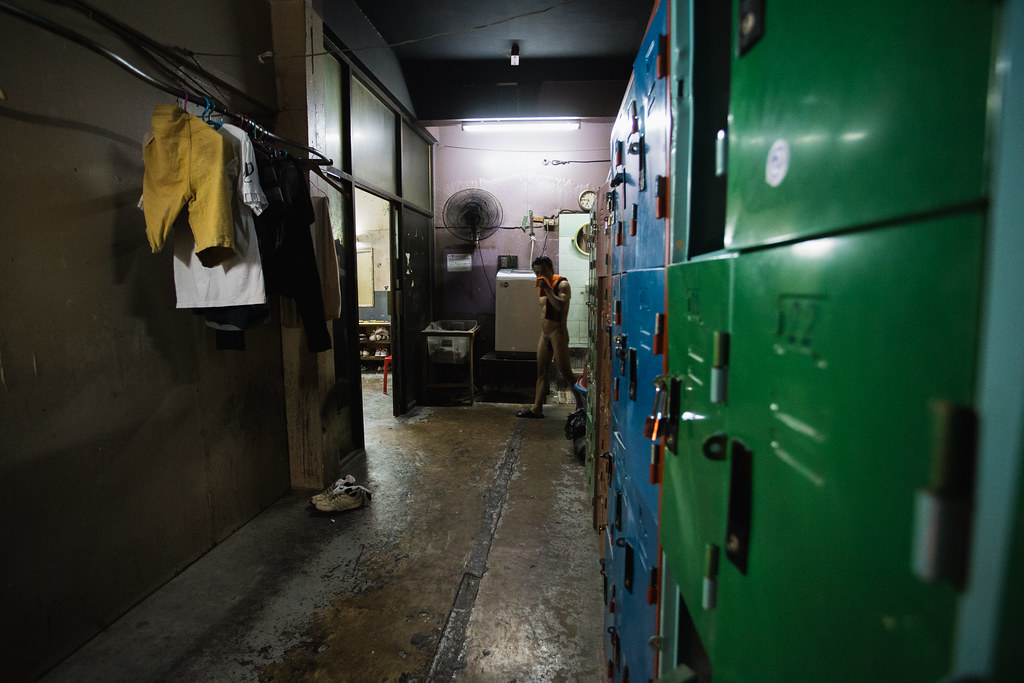
Working condition of service workers.
Every evening, Bo and his friends who work at SWING will take bags containing condoms, lube, snacks, milk, and brochures advertising free health check-ups at the Foundation’s clinic, and distribute them to service workers at various places. The snacks and milk help them cut down on living costs, while condoms and lube help enable them to protect themselves from sexually transmitted diseases.
Deep into the street lined with go-go bars and massage parlours that also offer sex as an add-on option, Foundation workers approach the service workers like meeting a friend. They exchange news about each other, gossip about clients, sigh about their families, or chat about the latest trendy soap opera.
Some service workers, especially those who work in massage parlours, often use the time in the evening before the night begins to video-call their wives and children living in their hometowns. Then comes the voice of the parlour owner calling their number, letting them know that they must end their calls and get to work.
In front of a nearby go-go bar, the bar manager, who is known to outsiders as the “mae-lao” or “mamasan”, is worshipping the household god, asking for a blessing for tonight’s business. Mae Daeng (pseudonym), a man in his 50’s, lights an incense stick on a tiny tray of food and places it at the corner of the front door, reciting a prayer. He then pours a shot of liquor and splashes it in front of the shop, believing that it will bring a full house for the night.
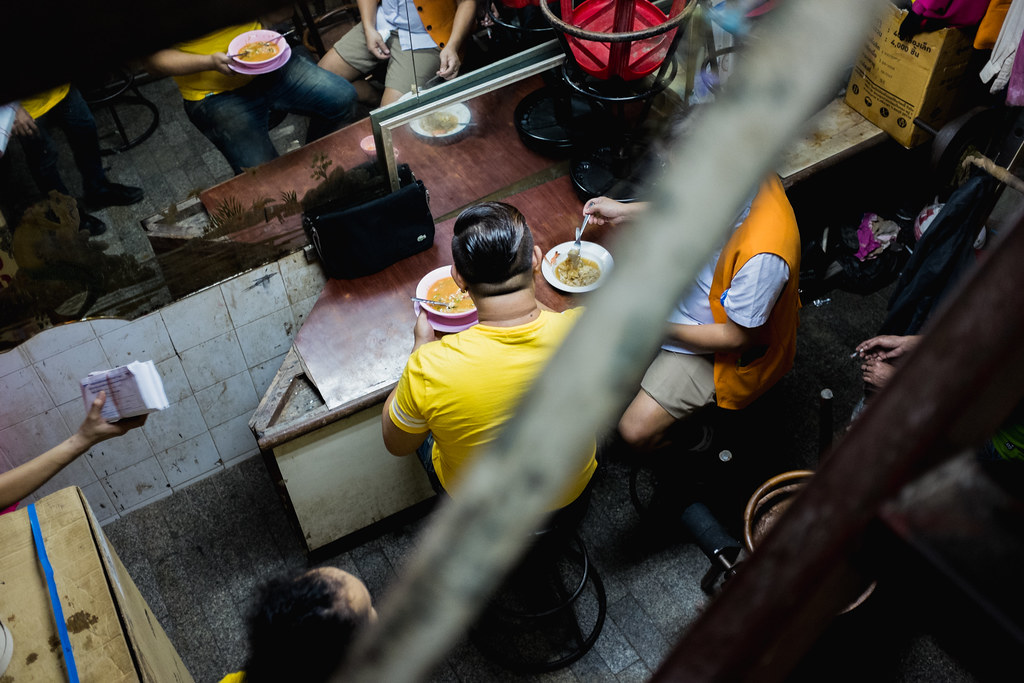
Mamasan, a manager of service workers.
Mae Daeng said that the service workers call the manager or the mamasans “khun mae” (“mother”) or “mae” (“mom”). Most of the “mothers” are former service workers themselves, but with age, experience, and the owner’s trust, they are promoted to “mother”, acting as bar managers. They take care of the business and look after the service workers who work for them.
Unlike massage parlours, most go-go bars or beer bars that provide sex services with service workers don’t have private rooms. A client will take out or “off” a service worker to a hotel nearby, which makes it the mamasan’s duty to follow and take care of him. If he disappears for longer than usual, the mamasans will check the safety of the male service worker right away through a network surrounding that area.
Not very far from Silom Road, alongside the skytrain station in Phaya Thai, a karaoke bar zone that hides LGBT prostitution has been fading. An owner sighs and tells the story in a bored voice that the regular customers were aged trans. The customer market has evolved into internet deals, and the system of sitting with a drink in a karaoke bar is no longer popular.
“Soon the business will close, but the state officials keep extracting [money from us] even when we do not have customers. I’d rather make a living in the countryside,” one owner of karaoke bar said and sighed.

Male service workers in Thailand: the path they can’t choose.
Three blocks from the karaoke bar, another also used to provide prostitutes for LGBT, but has now been renovated into an Isan food restaurant. A mortar, a gas stove and a pan were put in front of the shop, sending an aroma that attracts people passing by to order food in the early evening.
In other words, as customers’ behaviour changes and there other jobs they can do, mamasans, owners, and male service workers just change and disappear from the area. In the end, no one wants to use their body to make a living until they die. Many dream of going back to the place they come from and working as a farmer or having their own business.
Yet some of them cannot get that far, still moving around in sex service work until they’re old. Some of them turn into bar managers, different kinds of shop owners, and mamasans.
Prachatai English is an independent, non-profit news outlet committed to covering underreported issues in Thailand, especially about democratization and human rights, despite pressure from the authorities. Your support will ensure that we stay a professional media source and be able to meet the challenges and deliver in-depth reporting.
• Simple steps to support Prachatai English
1. Bank transfer to account “โครงการหนังสือพิมพ์อินเทอร์เน็ต ประชาไท” or “Prachatai Online Newspaper” 091-0-21689-4, Krungthai Bank
2. Or, Transfer money via Paypal, to e-mail address: [email protected], please leave a comment on the transaction as “For Prachatai English”

